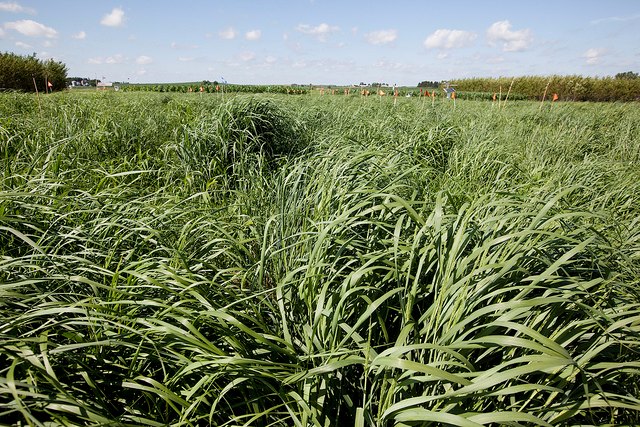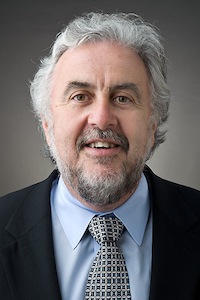DOE renews Great Lakes Bioenergy Research Center

Switchgrass, shown here at UW’s Arlington Research Station, can be grown and used for biofuels.
The U.S. Department of Energy (DOE) has awarded the University of Wisconsin–Madison $25 million per year to fund the Great Lakes Bioenergy Research Center (GLBRC) for another five years.
Established by a DOE Office of Science Biological and Environmental Research grant in 2007, the GLBRC is housed at UW–Madison and includes a major partnership with Michigan State University. The GLBRC supports nearly 400 researchers, students and staff spanning a wide array of disciplines, from microbiology to economics to plant biology and engineering. The innovations born of these unique collaborations provide the basic scientific foundation for the sustainable, large-scale production of advanced cellulosic biofuels technologies that will help meet the nation’s growing energy needs.
For complete set of details on the renewal, including photos, video and background, visit the GLBRC site.
“GLBRC researchers, in partnership with the State of Wisconsin, the State of Michigan and affiliated industries, have made substantial progress toward developing the next generation of advanced biofuels. Renewal by the Department of Energy permits us to build on these scientific breakthroughs and accelerate our efforts to develop sustainable biofuels strategies, from growing plants for use as energy feedstocks to exploring novel ways to convert the non-edible components of plants into fuels for the automotive, diesel and aviation sector,” said Tim Donohue, GLBRC director and UW–Madison professor of bacteriology.
Rather than focus its effort on designing an ideal biomass crop or a single conversion platform, the GLBRC is taking a holistic “field to fuel approach” that evaluates the energy efficiency, sustainability and economic viability of various technologies.
“This approach allows farmers or fuel producers in different parts of the country to select the pieces of our technology that work best for their crops, climate or fuels,” said Ken Keegstra, GLBRC scientific director and MSU Distinguished Professor of plant biology and of biochemistry and molecular biology.
The center’s research portfolio is focused on four core areas: sustainability, plants, deconstruction and conversion. “From Field to Fuel,” a selection of GLBRC research highlights, is available online.
“The extension of GLBRC’s award by the Department of Energy demonstrates UW–Madison’s excellence in alternative energy research. For generations, Wisconsin residents have invested in UW–Madison and that investment has helped us become an international leader in the plant sciences, microbiology and engineering. Continued investment by the state, combined with this five-year renewal for GLBRC, will enable us to continue to draw on these strengths to develop new and innovative technologies that will bring about American energy sustainability,” said UW–Madison Interim Chancellor David Ward.
Building on the center’s approach to fostering multidisciplinary research, GLBRC is now housed in the Wisconsin Energy Institute. As the only university-based DOE Bioenergy Research Center, the center is benefiting from strategic collaborations on both campuses that will help transition discoveries into real-world technologies.
“MSU is proud of the expertise and experience we bring to this effort, from our world-renowned plant research to our faculty in engineering, agricultural economics, and education, as well as the scientists at the scale-up facilities at MBI. The GLBRC has provided unprecedented opportunities for us to collaborate across campuses and disciplines,” said MSU President Lou Anna K. Simon. “We know that this integrated approach will drive the most powerful solutions to our energy challenges.”
Working with the Wisconsin Alumni Research Foundation and other member institution technology transfer offices, center members have submitted 60 invention disclosures and 58 patent applications, and are working with outside companies on 17 potential licenses or options. In 2012, the center celebrated two significant milestones: the first U.S. patent and the licensing of GLBRC technology to Hyrax Energy — the first company to emerge from the center.
“As the biofuels industry picks up speed, the private sector is counting on federally-funded basic research like the DOE Bioenergy Research Centers to provide new insight that will help us meet the broad challenges of reducing cost and meeting demand for advanced biofuels,” says William D. Provine, director of science and technology external affairs at DuPont and a member of GLBRC’s scientific advisory board.
As GLBRC leaders enter a second funding cycle, their goal is to continue integrating the center’s expertise in support of two key knowledge gaps: sustainable production of crops containing desirable biofuel traits and efficient conversion of biomass into fuels and chemicals.
“With a strong record of producing scientific advancements, I am confident that we have the momentum to continue developing innovative, industrially relevant breakthroughs to support the advanced biofuels industry,” said Donohue. “We’ve solved major challenges and laid the groundwork with our initial round of funding, and the next five years will be all about meeting new challenges.”





